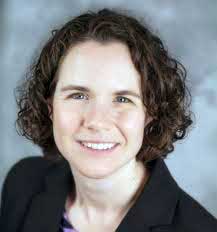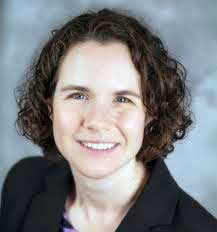 KINGSTON, R.I. – April 30, 2015 – A state program that helps workers care for sick relatives, newborns and adopted children has been a hot topic in Rhode Island and beyond, and now a University of Rhode Island scholar is weighing in on the issue.
KINGSTON, R.I. – April 30, 2015 – A state program that helps workers care for sick relatives, newborns and adopted children has been a hot topic in Rhode Island and beyond, and now a University of Rhode Island scholar is weighing in on the issue.
A study by Shanna Pearson-Merkowitz, an associate professor of political science at URI, found that while the program is likely to help the Rhode Island economy, there are ways to improve it. The study found that low-income workers contribute more of their salaries to the program, but may be using it less than high-income workers.
Rhode Island is one of only a handful of states to offer temporary caregiver insurance, signed into law last year. Pearson-Merkowitz and her student, Rachel-Lyn Longo, examined programs in California and New Jersey, as well as Rhode Island.
Rhode Island’s program provides job protection and up to four weeks of benefits to workers to care for a sick relative or domestic partner or bond with a newborn child, adopted child or foster child. It is paid for through an employee payroll tax.
“While having workers fund the program makes sense,” says Pearson-Merkowitz, “the particular structure of the employee contribution system is, in practice, regressive, in that it places a greater burden on low- and middle-income workers.”
The program, she says, is funded through a fixed tax rate applied to a worker’s taxable earnings up to a specific income, above which the tax is no longer applied. The combination of a flat tax rate and an income cap means “low- and middle-income workers end up paying a greater percentage of their earnings to fund the program than high-income workers.”
Pearson-Merkowitz says data she examined from California shows that low-income workers are less likely to use the program. “The data suggest that paid family leave is drastically underutilized by those who need it most – the working poor.”
That could be because lower-wage workers don’t know about the program, she says, or are unaware that they pay into it. She says a more troubling problem is that many low-income workers might not be able to afford to take a leave, even when they can get the temporary benefit.
“For Rhode Island families already living in poverty, losing a third of their income may simply leave them with too little to make ends meet,” says Pearson-Merkowitz. “Most likely, workers like these simply cannot afford to take time off, even with the wage replacement provided by paid family leave.”
The solution, she suggests, is to continue to build on efforts by the Department of Labor and Training to ensure that workers from all economic backgrounds and in all industries know about the program, as well as the job protection it provides.
The state should also consider adopting a more “progressive wage replacement system” to ensure that lower-wage workers who take paid family leave don’t fall into poverty while caring for a sick child, spouse or parent.
“Given that low- and middle-wage workers are those who both need paid family leave the most and who pay the largest portion of their salary into the program, it is essential that these workers can afford to take advantage of it,” says Pearson-Merkowitz. “Ensuring all workers have access to paid family leave could also be a smart economic move for the state. It could keep people employed and reduce social service reliance during times of family crisis, and lead to higher earnings, and thus more tax revenue in the long run.”
In fact, Pearson-Merkowitz says California families using the program report better social, economic and physical health than those with a new child or sick relative who did not take advantage of the program.
“Receiving care from family members has been shown to drastically improve health outcomes and recovery from illness, especially among children and the elderly,” she says. “Studies also show that mothers who take paid leave to care for a newborn breastfeed for twice as long.”
Paid family leave also improves the economy, says Pearson-Merkowitz. Studies show that women who take leave after childbirth are more likely to keep their jobs, which translates into more taxes for the state, a better economy and fewer people relying on state services.
Research also suggests that businesses in California and New Jersey are generally happy with paid family leave, Pearson-Merkowitz says.
“Some employers in New Jersey witnessed improved worker morale,” she says. “Employers also applaud paid family leave as a cost-saving measure because it reduces employee turnover, saving employers from hiring and training replacement workers.”
The study was funded by the College and University Research Collaborative, a partnership of the state’s 11 colleges and universities that connects public policy and academic research. One of the organization’s goals is to increase non-partisan research and policymaking.
Longo, who graduated from URI last year, worked on the study with Pearson-Merkowitz for her senior honor’s thesis. So far, the collaborative has awarded about $100,000 in research grants.
“This is just one example of the excellent work being done across Rhode Island’s higher education institutions through the collaborative,” says Katharine Flynn, URI collaborative fellow and executive director of the URI Business Engagement Center. “URI is thrilled to be part of this great initiative.”
“Professor Pearson-Merkowitz’s research is not just an issue of importance to Rhode Islanders, but also to those at the national level,” says Amber Caulkins, program director of the collaborative. “Having students participate in research like this is a great way to connect students to Rhode Island and see how they can participate in important policy challenges.”
For more information about the study, visit Collaborative.
Pictured above: Shanna Pearson-Merkowitz, an associate professor of political science at the University of Rhode Island. Photo courtesy of the College and University Research Collaborative.

